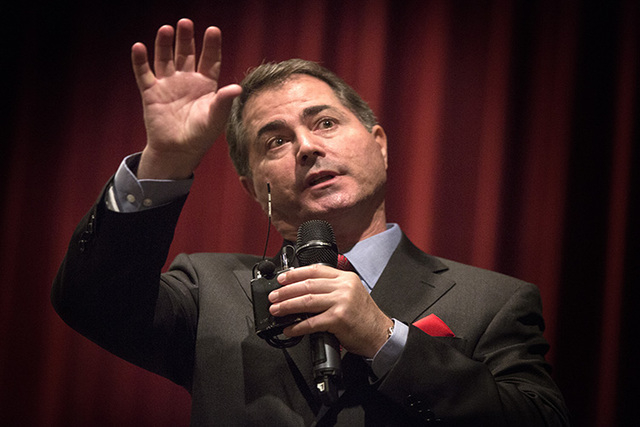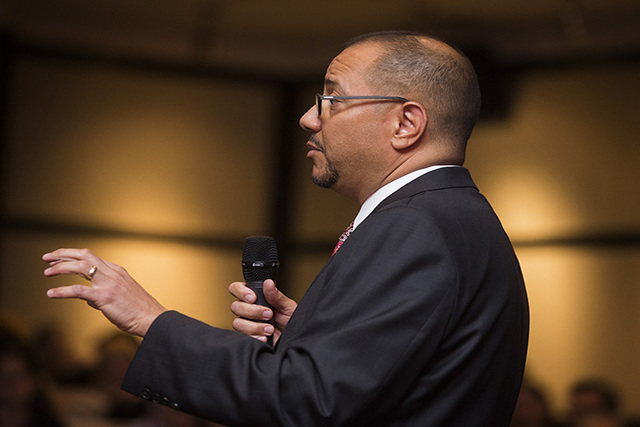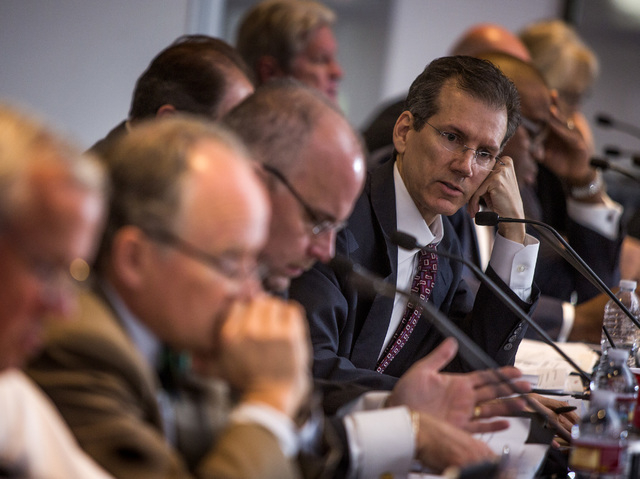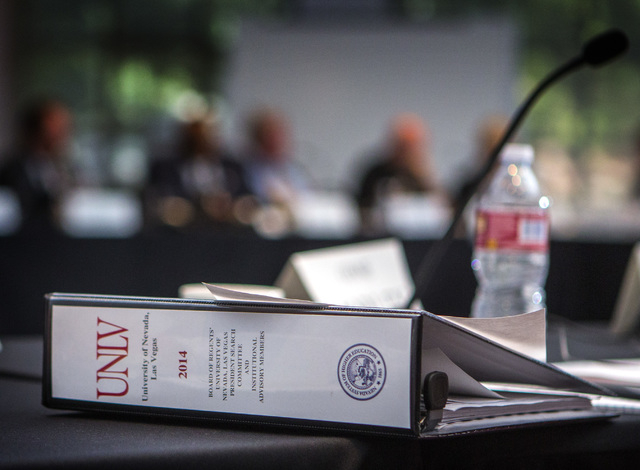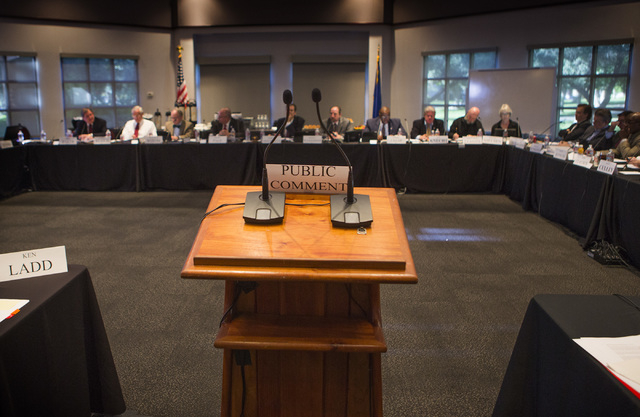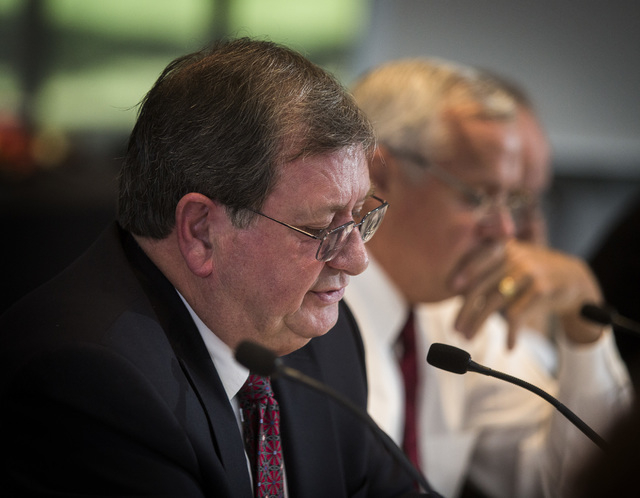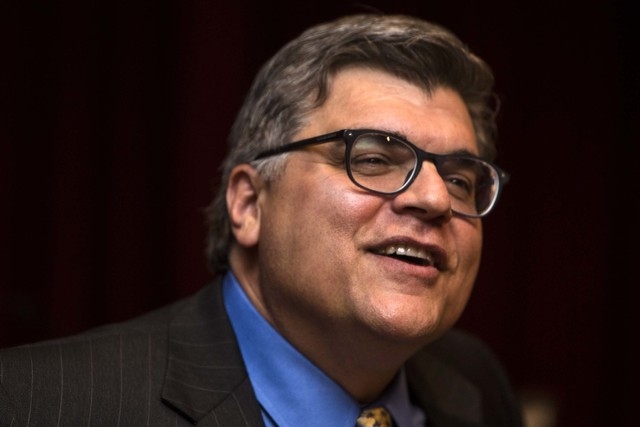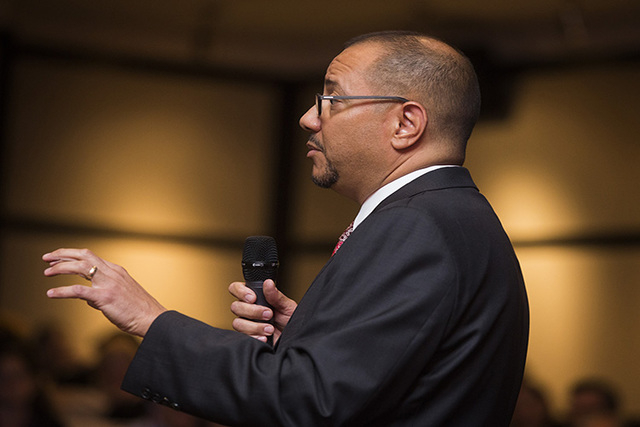UNLV presidential search committee recommends Jessup
University of Arizona business school dean Len Jessup is expected to be named the next president of the University of Nevada, Las Vegas.
Jessup, considered a rising star in higher education, was one of three finalists interviewed for the job last week and late Monday. He was chosen as the recommended candidate by a Board of Regents search committee after a 10-hour meeting.
Counting five regents on the search committee and four others who attended the meeting, Jessup has the support of at least nine of 13 regents, enough to be named UNLV’s president.
One member of the search committee, Regent Cedric Crear, was flabbergasted by the decision. Crear supported UNLV Provost John White.
“I don’t understand it. I don’t get it. I guess this committee is looking for a silver bullet in someone who is an unproven commodity,” Crear said. “It’s too bad.”
Crear was critical of Jessup for his lack of experience and believed White was an exceptional candidate who had proved himself as provost for two years and during his time as Boyd Law School dean.
Some of those supporting Jessup felt White needed more experience. Board of Regents Chairman Kevin Page felt White might be the right fit when UNLV is looking for its next president. Regent Michael Wixom said UNLV needed the change an outsider would bring.
A special meeting of the Board of Regents is set for this afternoon, when a vote will be held on who will be the next president. Jessup is expected to attend the meeting.
The University of Arizona dean and San Francisco native must choose to accept the position and negotiate a contract. He said earlier Monday he was ready to be UNLV’s next president.
UNLV’s next leader faces a mandate to create a medical school and push the university as it strives to earn a Tier 1 ranking as a research university, a prestigious designation from the Carnegie Foundation for the Advancement of Teaching.
Atlanta-based consultant Jerry Baker, who presented the committee with the three finalists, said he contacted Jessup soon after the vote. “He was elated, overwhelmed and teary-eyed,” Baker said.
Nevada System of Higher Education Chancellor Dan Klaich said he was “absolutely satisfied with the decision.” Klaich said his goal was to create a tough choice for the regents by presenting three well-qualified candidates, and he felt that he succeeded. “It was impossible to lose today,” the chancellor said.
The committee heard from all three candidates Monday during a grueling interview process, as each candidate for 90 minutes answered questions about their past, their goals and their desire for the job. By about 5 p.m. that process ended, and search committee advisory members announced their recommendation.
Jessup and White were the clear front-runners. Georgia Regents University President Ricardo Azziz was the odd man out.
Regent James Leavitt, who attended the meeting, said Azziz had the experience and intelligence for the job but was not a good fit for UNLV.
Advisory member Kristin McMillan said Azziz’s past raised too many issues, including questionable expenditures at GRU. “He seemed like the type of person who’d rather ask for forgiveness later than permission first,” she said.
Undergraduate Alex Culley, who was an adviser to the search committee, said there was widespread student support for White.
During his 90 minutes, White stressed his intimate knowledge of Nevada’s political landscape, his belief that shared governance with faculty is the most efficient way to run a university and his success as dean of Boyd Law School.
“Our campus needs inspirational leadership to earn the trust of (all employees) to move this university forward,” White said.
White discussed the need to grow UNLV’s resources so it can reach its longtime goal of being a prestigious public research university. The provost added that UNLV also needs a president committed to being at the university to see long-term projects through, such as the proposed medical school. He said there has been too much turnover in the president’s office. He said he is committed to UNLV and Las Vegas.
White also was questioned for his role in interim President Don Snyder’s decision to call for an academic review of a controversial report about the recently defeated margins tax, which has made some question his support of academic freedom.
White said his role in the situation was as an adviser to the president and stressed his role in support of the chief executive of the university. “It’s not the statement I would make” if he was president, White said.
He said he strongly supports academic freedom and fostering “robust debate.”
White said faculty morale is an ongoing issue that must be resolved, and he said he would focus on faculty development.
Jessup spoke next.
The University of Arizona dean said that he believes strongly in collaborative leadership. “This is a team sport,” Jessup said of running a university.
Jessup stressed his experience as a fundraiser at Washington State University. He said the fundraising strategy at a university needs two partners in alumni and athletics. He said UNLV has gone too long — nearly five years — without a fundraising campaign.
Jessup said public universities have to learn to rely less on public funding and become more self-sustaining.
He said athletics acts as a window into which the public views the university: Therefore it must be “squeaky clean.”
Jessup also was questioned about embarrassing emails that surfaced regarding a close relationship with a female employee under his supervision at Washington State University.
Jessup said that he disclosed to his supervisor, the university president, that there was an interest between him and a woman he supervised. “Some separation was created so we could explore a relationship,” if they wanted, Jessup said. “You have to be extra diligent in how you carry yourself.”
The committee then heard from Azziz, who emphasized his years as a medical school and hospital administrator, including managing a $1 billion budget as head of Georgia Regents University and Georgia Health Systems.
The medical doctor said his focus as president would be to sell the vision of the university where it educates students, develops research that helps the community and is an economic engine.
But a university must be more, he said, adding that students must graduate as thoughtful individuals, which requires a strong liberal arts education on top of growth in STEM — science, technology, engineering and math courses.
UNLV, Azziz said, “is on the threshold of greatness.”
Azziz also was questioned by the committee about his questionable expenditures at GRU, including attempting to add a $70,000 carport to the president’s home, which is owned by the Georgia board of regents. He also was scrutinized for using university resources at his niece’s wedding, including a bus and driver and security, which he paid for.
Azziz attributed the lapses to miscommunication and misunderstandings. He blamed the negative press he received from the two incidents on anger from the local newspaper, the Augusta Chronicle, over the changing of the university’s name to GRU.
He said that his staff didn’t know they needed approval from the board of regents to make a change to the president’s home. The project was dropped after the issue was reported because “it wasn’t worth it,” he said.



